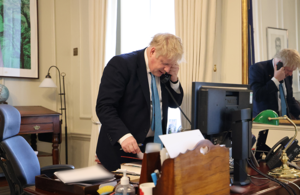Le Royaume-Uni isolé sur la question de l’Ukraine? Pas de mon point de vue
J’ai lu avec intérêt un article arguant que le Brexit avait contribué à l’isolement du Royaume-Uni au sujet de l’Ukraine, tout en admettant que Boris Johnson était un des premiers à avoir proposé des sanctions à l’encontre de la Russie en excluant des banques russes du système SWIFT – ce qui a ensuite été mis en pratique par l’UE –, et que le Royaume-Uni avait été le premier pays à donner des armes de défense aux Ukrainiens en début d’année – ce qui a été suivi comme un exemple par d’autres pays européens. L’article a donc critiqué à la fois la mise en œuvre de la Revue Intégrée, qui a pour but d’activer une diplomatie forte autour du monde, soutenue par des partenariats ; mais il a aussi jugé la ‘réactivation’ des alliances historiques comme une faiblesse. N’y aurait-il pas là une contradiction ?
Il faut être clair : je n’ai pas pour objectif de débusquer chaque idée fausse à propos du Royaume-Uni. Le but est avant tout de mettre fin à cette guerre terrible en Ukraine. Et pour y arriver, il faut une détermination collective face à l’horreur que Poutine a déclenchée ; une détermination fondée sur notre attachement commun et profond à la paix, à la démocratie et à la liberté.
Bien entendu, l’Union européenne joue un rôle essentiel à cet égard, un rôle auquel nous, au Royaume-Uni, attachons une grande importance. C’est pourquoi la Ministre des affaires étrangères britannique Liz Truss a assisté au Conseil des Affaires Etrangères avec le Secrétaire d’Etat américain Antony Blinken et le Secrétaire général de l’OTAN Jens Stoltenberg. C’est pour cela aussi que nous avons dédié plus de 400 millions de livres d’aide humanitaire et économique pour l’Ukraine, et redoublé nos renforts de l’OTAN – nous faisons tout ce qui est en notre pouvoir pour montrer notre solidarité à l’égard de nos amis, en particulier ceux du flanc est.
Le Royaume-Uni soutient ces efforts, avec les Etats-Unis entre autres, avec une force catalytique. Il y travaille dans le cadre du format « Quad » (avec la France, les Etats-Unis et l’Allemagne), ainsi qu’avec les pays du groupe de Višegrad, mais aussi à Londres avec le lancement du Groupe de Soutien International à l’Ukraine avec Mark Rutte et Justin Trudeau la semaine dernière, ou encore lors de la réunion de la force expéditionnaire commune (JEF) cette semaine. La diplomatie n’est pas un jeu à somme nulle. Il s’agit de rassembler autant de partenaires que possible pour faire force ensemble. D’où le poids de la résolution de l’Assemblée Générale de l’ONU, approuvée par 141 Etats, condamnant les actions du gouvernement russe.
Prenons l’exemple des sanctions. Depuis l’invasion de la Russie, le Royaume-Uni a sanctionné plus de mille personnes, entités et filiales parmi les plus importantes et les plus précieuses de Russie. Cela porte à plus de 800 le nombre total de personnes visées, y compris contre 18 des principaux oligarques russes, dont la valeur totale des richesses dépasse 30 milliards de livres sterling. Cela a un coût pour le Royaume-Uni, tout comme les sanctions européennes vont avoir un coût pour les Français. Mais si notre objectif commun est de soumettre une pression économique punitive à l’encontre du régime russe, en démontrant que rien – ni personne – n’échappe à la possibilité d’être sanctionné, je dirais que les trains de sanctions complémentaires du Royaume-Uni, et des Etats-Unis, et de l’Union Européenne, et du Canada font la force.
Enfin, je souhaite clarifier la position du gouvernement britannique sur cette fameuse question de la sécurité européenne. J’ai moi-même travaillé sur la Revue Intégrée de la sécurité, du développement et de la politique étrangère du Royaume-Uni et je tiens à attirer votre attention sur cette ligne fondamentale : « Notre engagement envers la sécurité européenne est sans équivoque ». La région euro-atlantique reste la pierre angulaire de notre sécurité, et il est absurde de suggérer le contraire. En dehors de l’OTAN – ce qui n’est pas facile à dire étant donné son poids et le soutien des Etats-Unis – nous travaillons ensemble, de manière bilatérale, par l’intermédiaire de l’OSCE et de petits groupes nommés plus haut pour défendre nos valeurs communes, contrer les menaces partagées et renforcer la résilience dans notre voisinage. Le constat positif de tout cet épisode tragique est la coordination étroite qui perdure entre l’UE, le Royaume-Uni et les Etats-Unis.
Avec tous ces exemples de partenariats, de diplomatie active, de coordination, de bonne foi, j’espère pouvoir enclencher un nouvel état d’esprit. Le Royaume-Uni reste un pays profondément européen, ainsi qu’un acteur mondial. Le succès d’un de nos alliés est le succès de nous tous – surtout s’il agit de sauver des vies. Ecartez-vous des récits inutiles présentant des gagnants et des perdants – seul Poutine pourra en profiter. L’heure est à l’unité pour trouver un moyen d’en finir avec cet enfer.
Dame Menna Rawlings, Ambassadeur du Royaume-Uni en France
